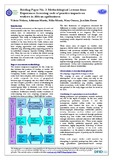Methodological Lessons from Experience: Assessing code of practice impacts on workers in African agribusiness.
| dc.contributor.author | Nelson, Valerie | |
| dc.contributor.author | Martin, Adrienne | |
| dc.contributor.author | Morris, Mike | |
| dc.contributor.author | Omosa, Mary | |
| dc.contributor.author | Ewert, Joachim | |
| dc.date.accessioned | 2013-06-24T15:43:24Z | |
| dc.date.available | 2013-06-24T15:43:24Z | |
| dc.date.issued | 2005 | |
| dc.identifier.citation | Briefing Paper No. 3: Methodological Lessons from Experience: Assessing code of practice impacts on workers in African agribusiness | en |
| dc.identifier.uri | http://projects.nri.org/nret/final_methodology_briefing_paper.pdf | |
| dc.identifier.uri | http://hdl.handle.net/11295/39263 | |
| dc.description.abstract | Until recently, information on the impact of social and environmental codes has been anecdotal. However, a critical mass of information is now emerging, including lessons regarding the methods that can be employed. This study, an independent 4-year DFID funded project, focused on the impact of codes on workers at the farm level in the South African wine and Kenyan cut flower industries. Impact assessments have varying approaches and sometimes multiple objectives (e.g. informing policy, improving practice in an individual company, capacity building, reflection, etc.). Here, the aim was to inform the debate among civil society, the private sector and government as to the future role of social codes of practice in improving worker livelihoods. | en |
| dc.language.iso | en | en |
| dc.title | Methodological Lessons from Experience: Assessing code of practice impacts on workers in African agribusiness. | en |
| dc.type | Working Paper | en |
| local.publisher | Institute of development Studies, University of Nairobi | en |

